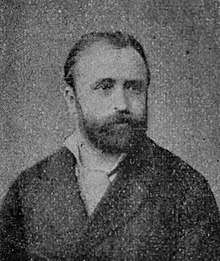Victor Leydet
Victor Leydet (1845-1908) was a French businessman, politician and novelist. He served as a member of the Senate of France from 1897 to 1908.
Victor Leydet | |
|---|---|
 Leydet in 1894 | |
| Born | July 3, 1845 Aix-en-Provence, France |
| Died | October 22, 1908 Paris, France |
| Resting place | Saint-Pierre Cemetery, Aix-en-Provence |
| Nationality | French |
| Occupation | Businessman Politician Novelist |
| Children | Edmond Leydet Fernand Leydet Louis Leydet Lucien Marc Leydet Paul Gabriel Leydet Francia Leydet Sextia Leydet |
| Parent(s) | Joseph Vincent Leydet Marie Françoise Laurin |
Biography
Early life
Victor Leydet was born on July 3, 1845 in Aix-en-Provence.[1][2] His father, Joseph Vincent Leydet, was a factory worker.[1][2] His mother was Marie Françoise Laurin.[2] He was educated at the Collège Mignet (then known as the Collège Bourbon) in Aix.[2]
Business career
He started his career as a shop assistant in shops in Aix.[1] Later, he became Director of one of the biggest olive oil factories in Provence.[1]
Political career
A staunch supporter of the Republic, he joined the Radical Left, a left-wing political party.[1][2][3] He was elected to the town council of Aix in 1870.[1] He also served as Deputy-Mayor of Aix from 1876 to 1882, when Salomon Bédarrides (1809-1886) was the Mayor.[1] He also joined the General Council of the Bouches-du-Rhône (representing Peyrolles), when he campaigned for match-making factories to be returned to the French homeland rather than in her colonies; they were returned to France in 1872, and a new match-making factory was built in Aix from 1892 to 1895 (now reconverted as the Bibliothèque Méjanes, a public library, since 1989).[2] He also worked as a judge in the Chamber of Commerce.[1]
He served as a French Senator from 1897 to his death in 1908.[1] He was opposed to the policies of Léon Gambetta (1838-1882) and Jules Ferry (1832-1892), and he voted against extending the Tonkin Campaign in Vietnam.[1] Additionally, he voted in favour of the separation of church and state.[1] He proposed a law to establish an income tax which would be progressive and proportional.[1] He supported a break-up of the match-making industry in France, a French state monopoly which lasted from 1872 to 1992 (initially established to finance the Franco-Prussian War of 1870-1871).[1][2] In his second tenure, which started in 1903, he opposed the policies of Maurice Rouvier (1842–1911) Pierre Tirard (1827-1893) [1] He was also in favour of going after General Georges Ernest Boulanger (1837–1891), who attempted a coup d'état in 1889.[1] He took a look at regulating the use of the Durance, protecting wild birds, increasing the number of fields of olive trees and tobacco in Provence, and promoting the Étang de Berre.[2] Moreover, he was in favour of encouraging army recruitment, increasing railway tracks in France, and maintaining the University of Aix in Aix.[1][2]
Novelist
He wrote three novels set in Aix, published weekly in the newspaper Le National.[2]
Personal life
He married Louise Ely.[2] They had five sons and two daughters:
- Edmond Leydet (1869-unknown).[2] He was a Prefect of Eure-et-Loir.[2]
- Fernand Leydet (1871-unknown).[2]
- Louis Leydet (1873-unknown).[2] He was a painter.[2]
- Lucien Marc Leydet (1874-unknown).[2]
- Paul Gabriel Leydet (1876-unknown).[2]
- Francia Leydet (1877-unknown).[2]
- Sextia Leydet (1883-unknown).[2]
His son Louis was friends with painter Paul Cézanne (1839-1906).[2] As a result, Victor Leydet attended Cézanne's funeral and said a few words about him.[2]
He died on October 22, 1908 in Paris.[1] His corpse was returned to Aix, and he was buried in the Saint-Pierre Cemetery in Aix.[2]
Legacy
- The Rue Victor Leydet in Aix-en-Provence is named in his honour.[2][4] He resided at number 40 on this street, formerly known as the Rue Villeverte.[2] On February 23, 1911, the town council decided to rename the street after him.[2]
- On December 18, 1910, a bronze bust designed by sculptor Auguste Carli (1868-1930) was dedicated on the Place Jeanne d'Arc in Aix.[2] Several ministers were present alongside a crowd of about 700.[2] However, the bust was stolen by the Germans in 1943, during World War II.[2] A new bust, made of plaster and initially on his cemetery tomb, is now in its place, behind a newsagent.[2]
References
- Senate
- Les Rues d'Aix
- Leo A. Loubere, Radicalism in Mediterranean France, Albany, New York: State University of New York Press, 1974, p. 165
- Google Maps